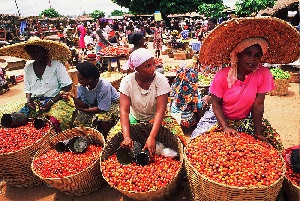 The situation has negatively impacted government
The situation has negatively impacted government
The country’s informal sector, according to data from the Ghana Statistical Services (GSS), is now worth more than a quarter of the economy’s total value – re-igniting the longstanding debate over finding innovative means to rope the sector into the tax net to shore up domestic revenue.
The 2018 annual Gross Domestic Product (GDP) figures from the GSS show that out of the country’s total GDP of GH¢300.5billion, the informal economy is worth some GH¢81.2billion and is growing at 2.6 percent per annum.
The figure, which translates into 27 percent of GDP, means that more than a quarter of economic activities in the country fall outside the tax net.
The situation has negatively impacted government’s domestic revenue mobilisation, thereby resurrecting calls for the Ghana Revenue Authority to devise innovative measures to rope the informal sector into the tax net.
Commenting on this, a professor of economics at the University of Ghana, Prof. Peter Quartey, said even though the informal sector’s activity is smaller compared to the formal sector, leaving it outside the taxpaying population still has an effect on the economy; hence, all efforts must be made to rope them in.
“It is a very important sector of the economy; it employs a large number of people, and so we need to get some revenue from there for government.
“Granted that even 5 percent of our tax revenue is lost through the informal sector, it is quite significant. If we can increase our tax GDP ratio by just 5 percentage points, that would be very significant. The benchmark for Africa’s tax to GDP ratio is 15 percent, and at the moment we [Ghana] are doing below that. So, if we can add another 5 percent, I am sure we will cross the 15 percent benchmark,” he told B&FT in an interview.
Government has estimated domestic revenue for 2019 to hit GH¢57.7billion, whereas overall tax revenue is projected at GH¢58.9billion, representing 17.1 percent of GDP.
Meanwhile, domestic revenue has consistently fallen short of its target over the years. For example, the domestic revenue target for third-quarter 2018 fell short by 9.5 percent, with GH¢31billion realised from a projected GH¢35billion. The amount realised is only 12.1 percent of GDP.
The World Bank’s Vice-President for Africa, Dr. Hafez Ghanem – during his visit to Ghana last month, said this must be dealt with if government wants to achieve the Ghana Beyond Aid vision.
“In Africa in general and in Ghana, we see that we have very low levels of revenue mobilisation. In Ghana today revenue is about 14 percent of GDP. In developed countries it is about 45 percent or even more to GDP.
“So, you need to develop your domestic resources; because you need to finance and provide public goods to your population, and you do that through domestic resource mobilisation. And when the president talks about Ghana Beyond Aid, it will succeed by mobilising domestic resources to replace foreign aid,” he said.